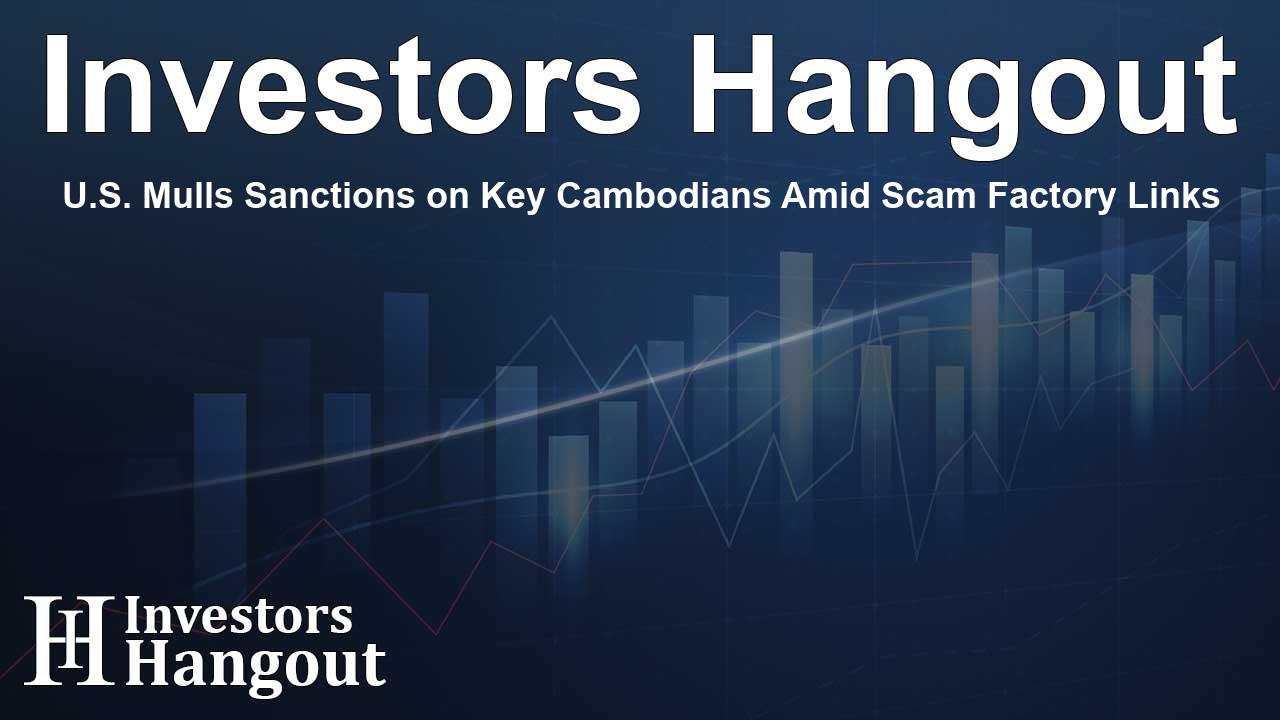U.S. Mulls Sanctions on Key Cambodians Amid Scam Factory Links

U.S. Plans to Impose Sanctions on Cambodian Officials
The United States is reportedly preparing to impose sanctions on specific Cambodians, including individuals associated with the ruling party, over allegations of involvement in online scams and human trafficking operations. This significant action is anticipated soon and highlights growing concerns about the intersection of crime and governance in the region.
Worsening Ties Due to Sensitive Projects
The potential sanctions emerge during a turbulent period in U.S.-Cambodian relations, particularly after the Cambodian government initiated a controversial canal project, which is backed by China. This project has raised alarms among U.S. officials, who are concerned about the implications it holds for the delicate balance of ecological and geopolitical issues in the Mekong region.
Strengthening Military Alliances with China
In recent times, Cambodia has fortified its military cooperation with China, with Chinese naval vessels visiting the nation earlier this year. Besides, there is ongoing support for expanding strategic military installations, which contrasts with the diplomatic engagements the U.S. is attempting to promote.
High-Profile Targeting and Implications
According to multiple sources familiar with the situation, at least one high-profile Cambodian individual close to the political elite is slated to be targeted in the sanctions. However, the specifics regarding the identities of these individuals and the nature of the sanctions remain unclear at this moment.
The Stance from Cambodian Officials
The Cambodian government has not publicly commented on the looming sanctions or allegations. Attempts to reach their spokespersons have gone unanswered, leaving a void in public information regarding the government's response to the allegations.
Escalating Concerns Over Human Trafficking
The U.S. State Department has previously indicated that certain Cambodian officials have been involved in activities associated with human trafficking and other criminal undertakings. These revelations suggest a troubling pattern of complicity among several high-ranking officials within Cambodia’s government, indicating a systemic issue that exacerbates the severity of the crisis.
Rise of a Multibillion-Dollar Fraud Industry
In the backdrop of this situation, Cambodia and its neighboring countries have seen a surge in a multibillion-dollar scam industry. This operation often employs Chinese syndicates, taking advantage of trafficked workers, causing widespread repercussions for global victims grappling with fraudulent schemes. In particular, these crimes target vulnerable populations worldwide, presenting an urgent humanitarian and legal challenge.
International Response and Future Implications
Governments, including the UK, have already taken steps to address these nefarious networks. Recently, the UK imposed sanctions on multiple individuals and entities found complicit in trafficking activities spanning Cambodia, Myanmar, and Laos. The U.S. is considering adopting similar measures to counteract the pervasive influence of these scams.
Victimization of Americans
American citizens have reported significant losses due to these scams, totaling $2.6 billion in reported fraud losses in just one year. This figure illustrates the severity of the issue and highlights how these criminal networks have targeted individuals across different demographics in the U.S., with numerous cases of what is termed as 'pig butchering' scams—which entail long-term manipulation for financial gain.
A Glimpse of Change in Leadership
Cambodia's political leadership is undergoing a transformative period after the ascension of Prime Minister Hun Manet, the successor to his father, Hun Sen. Educated in the United States, Hun Manet's new leadership presents both challenges and opportunities for renewed relations with the U.S. However, underlying tensions primarily due to the ties with Beijing create a complicated roadmap for future diplomatic endeavors.
Frequently Asked Questions
What sanctions are the U.S. considering against Cambodia?
The U.S. is considering sanctions against prominent Cambodians allegedly linked to online scams and human trafficking.
Why has U.S.-Cambodia relations become strained?
Relations have become strained due to Cambodia's increasing military cooperation with China and controversial domestic projects.
How significant is the scam industry in Cambodia?
Cambodia has become a center for a multibillion-dollar fraud industry, impacting global victims.
What kind of scams are being reported?
Scams include long-term deceptions like 'pig butchering', leading to significant financial losses.
Has there been any international response to these scams?
Internationally, countries like the UK have imposed sanctions against individuals involved in the human trafficking linked to these scams.
About The Author
Contact Owen Jenkins privately here. Or send an email with ATTN: Owen Jenkins as the subject to contact@investorshangout.com.
About Investors Hangout
Investors Hangout is a leading online stock forum for financial discussion and learning, offering a wide range of free tools and resources. It draws in traders of all levels, who exchange market knowledge, investigate trading tactics, and keep an eye on industry developments in real time. Featuring financial articles, stock message boards, quotes, charts, company profiles, and live news updates. Through cooperative learning and a wealth of informational resources, it helps users from novices creating their first portfolios to experts honing their techniques. Join Investors Hangout today: https://investorshangout.com/
The content of this article is based on factual, publicly available information and does not represent legal, financial, or investment advice. Investors Hangout does not offer financial advice, and the author is not a licensed financial advisor. Consult a qualified advisor before making any financial or investment decisions based on this article. This article should not be considered advice to purchase, sell, or hold any securities or other investments. If any of the material provided here is inaccurate, please contact us for corrections.
